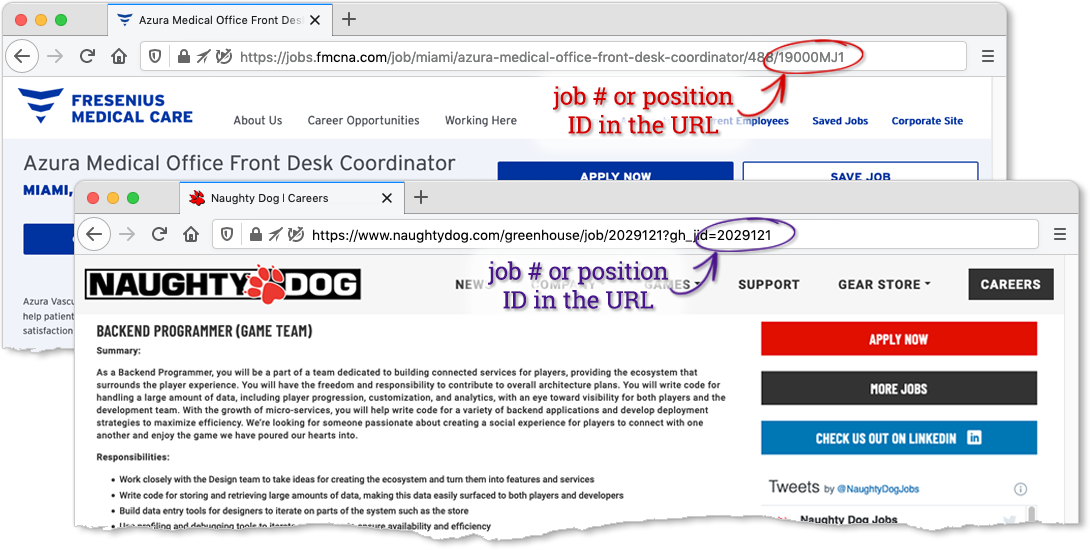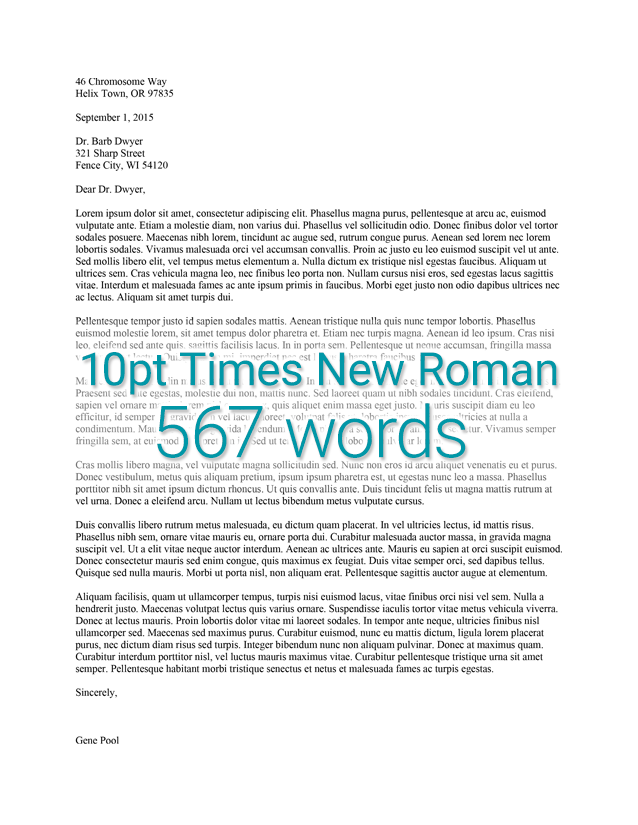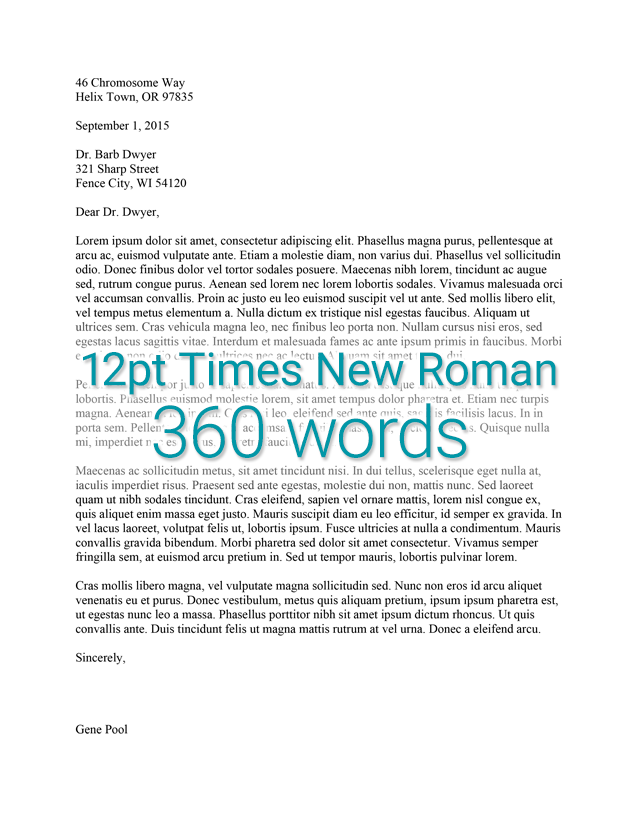Cover Letters: Frequently Asked Questions
- The job application I’m using says to copy my cover letter into a submission box / write my cover letter in the body of an email. What should I do for this project?
- Can I use a cover letter template?
- Does my cover letter need a recipient’s address?
- What if I can’t find the address?
- Who do I address my cover letter to?
- What if I can’t find the name of a recipient?
- What if I can’t find a position number or job ID number?
- I don’t have any paid experience in my career field. In my cover letter, can I talk about experiences I had in school?
- I don’t have any experience in my career field. What should I write about in my cover letter?
- Can I discuss personal information in my cover letter?
- How should I format my cover letter?
- How long should be cover letter be?
- Can I discuss things I plan to do / accomplish in my cover letter?
- In my cover letter, can / should I pretend I’m a senior / recent graduate?
- I’m still in high school. Should / Can I write my cover letter as if I’m in college and about to graduate?
- I’m a first year student / sophomore / junior / whatever. Can / Should I write as if I’m a senior / about to graduate / a recent graduate?
- What should I avoid at the start of my cover letter?
- Should I create (or use) letterhead for my cover letter (and/or follow-up/thank you letter)?
Frequently Asked JSP Cover Letter Questions
Q. The job application I’m using says to copy my cover letter into a submission box / write my cover letter in the body of an email. What should I do for this project?
A. For the purposes of the Job Search Portfolio project, you should write your cover letter as a traditional, print cover letter for postal mailing. Need help with letter formatting?
Q. Can I use a cover letter template?
A. No. You may not use a cover letter template of any kind. If you use a template, use a fill-in-the-blank sample, use a cover letter generator, borrow phrasing or sentences from a text you didn’t write, or try to game the system some other way, you will get a 0% on the Job Search Portfolio project.
It has happened before. Don’t let it happen to you.
Q. Does my cover letter need a recipient’s address?
A. Yes. Your cover letter should look like a letter, and letters include a recipient’s name and address. You should look for this information online—try to find a postal mailing address for the company or branch, and try to find the real name of a person who would likely review your materials (a supervisor’s name, an HR person, etc.)
Q. What if I can’t find the address?
A. You should be able to find some address. If you can’t find the address to a particular division of a company, use their corporate or head office address instead.
Q. Who do I address my cover letter to?
A. You should try to find the name of a person who would likely review your materials if you were really applying (a supervisor’s name, an HR person, etc.).
Q. What if I can’t find the name of a recipient?
A. If you absolutely cannot find the name of any person who would be likely to review your materials (if you were really applying), then use the next best piece of information you have to use in your salutation. See “Salutations, Names, Titles, and Closings.”
- If you don’t know a person’s name or gender, if possible, use the their job title or role (Dear Recruiter, Dear Claims Adjustor).
- If you are writing to a company rather than a specific individual, use the company name (Dear Pet Smart, Dear E.J.’s Garden Pros).
- When writing to a group, use an appropriate plural noun (Students, Employees, Customers). When appropriate, use a more direct, descriptive, or friendly plural noun (Hello 3213 Pro Writers, Dear FAU Employees, Dear Initech Team)
- Don’t ever write: “To Whom it May Concern”
Q. What if I can’t find a position number or job ID number?
A. Look in the listing URL—often the URL has a position number or job ID number at the end. See below.

Q. I don’t have any paid experience in my career field. In my cover letter, can I talk about experiences I had in school?
A. Yes! Absolutely!
The work you’ve done as an undergrad is work. Your classroom experiences are experiences. The projects you’ve completed for class are projects. The research you’ve done for classes is research. Your educational experiences are worth highlighting, especially if you don’t have paid experience in your field.
Always keep in mind that your cover letter, resume, and interview responses are intended to “prove” your qualifications for the position. What matters is the experiences, projects, and research that qualify you. It doesn’t really matter whether those experiences, projects, and research are paid or unpaid (or “work” or “educational”).
Q. I don’t have any experience in my career field. What should I write about in my cover letter?
A. Yes! Absolutely!
Even if you have no experience in your career field, you still have lots of options for what to write about in your cover letter.
First, let’s go back and think about the various purposes and functions of a cover letter:
- introduce yourself and make a good first impression
- provide context for resume (transmittal letter)
- show your qualifications; prove you fulfill the requirements of the position
- expand on items in your resume
- identify what you’ll bring to position/company
- stand out from other candidates
- ask for/get an interview
- prove your writing skill
The lighter font items are fairly easy to do: Introduce yourself and make a good first impression; provide context for your resume set; for an interview: improve your writing skill.
The items highlighted in yellow give you a chance to shine – even if you have no actual experience in your career field. You can do this by…
Showing how your knowledge—likely what you learned in your classes—prepare you for the position. If the employer is looking for someone who upholds high standards of patient care, but you have no experience caring for patients, perhaps you can discuss how you will apply what you learned in Fundamentals of Nursing Practice to your practice of patient care. If the employer is looking for someone who can perform patient health assessments, but you’ve never done a patient health assessment on a real patient, you can talk about a project that asked you to perform assessments as part of your Health Assessment in Nursing Situations Lab class.
Showing how you possess the skills, qualities, and/or abilities the employer is looking for. (sometimes called “transferable skills”) While the employer may be looking for someone who can adhere to government ethics guidelines, if you have no experience with government ethics guidelines, perhaps you can show how you adhered to ethical guidelines or ethical principles in some other way, or in some other role. If the employer is looking for someone who can lead a sales team to meet monthly sales goals, even if you have no formal leadership experience in this area, perhaps you can talk about how you lead your church youth group team to meet a fundraising goal, or discuss how you led a group of classmates through an exciting class project.
Q. Can I discuss personal information in my cover letter?
A. Only if it applies to the position in some way.
Some examples:
You grew up in a military family and lived in six different countries before your father retired from the military and settled in Florida. Should you discuss this in your cover letter?
You lived with and helped your aunt while she battled breast cancer—you took her to chemo, cooked her meals, ran errands, and helped to clean her house. Should you discuss this in your cover letter?
Q. How should I format my cover letter?
A. You should format your cover letter as a professional letter in block format.
Q. How long should my cover letter be?
A. For the Job Search Portfolio Project, your cover letter should be at least one full page (your cover letter should be formatted as a letter, so it should be singled spaced with an additional space between paragraphs).
Aim to write at least one full page. (While I don’t count words, I’d prefer a cover letter that goes over one page instead of one that goes under one page.)

A note about font and font sizes:
Sometimes when I read cover letter drafts, it’s clear the author is trying to make their text look longer—trying to make it fill more of the page without actually writing more words. The easiest (and most obvious) way to make a text look longer is to use 12 point Arial font.
First, technically, you should use a common, readable serif font for body text on printed pages. Serif fonts—like Times New Roman—are often considered better than sans-serif fonts for readability, speed, and comprehension. (See Arditi and Cho).
Second, using 12pt Arial font isn’t fooling anyone (especially not someone who is reading a stack of cover letters and can plainly see the difference between a page printed in 10pt Times New Roman and one printed in 12pt Arial). To illustrate the effect of size and font style on words per page, take a look at these four mock cover letters. Each version has 1 inch margins, single spacing with an extra hard return (or extra space) between paragraphs, and the same addresses, salutation, and signature block. The body text of each version uses automatically generated Lorum Ipsum placeholder text.
With 10pt Times New Roman, the word count of the body text is 567. With 12pt Arial, the word count is 313. In other words, the per page word count with 10pt Times New Roman is almost double the word count with 12pt Arial.
Since your cover letter is an opportunity to make an argument for why you’re an excellent candidate for the position, you should aim for quality and completeness. Usually, this takes people at least a page.
When I grade, I’m evaluating your rhetorical approach—I’m looking for quality and comprehensiveness. I’m looking to see whether you’ve made a compelling argument for yourself as an excellent candidate for the position.
Bottom line? While I don’t count words, please don’t think you’ve fooled me into thinking you’ve written a whole page by putting your cover letter into 12pt Arial font.
 |
 |
 |
 |
Q. Can I discuss things I plan to do / accomplish in my cover letter?
A. You may, but only if you actually have plans to accomplish the thing. For example, if you’ve already registered for a Teaching With Technology seminar coming up in July, then in your cover letter, you can write “To better meet the challenges of online teaching, I’ve registered for a “Teaching With Technology” seminar organized by the Florida Teaching Alliance.”
You should not, however, speculate about things a year or more into the future.
Part of the work of the JSP project is thinking rhetorically—finding ways to show how your current skills (both dedicated skills and transferable skills), experiences, and education make you a good candidate for the position.
Q. In my cover letter, can / should I pretend I’m a senior / recent graduate?
A. No. You may not pretend. You should present yourself as you are—right now. Part of the work of the JSP project is thinking rhetorically—finding ways to show how your current skills (both dedicated skills and transferable skills), experiences, and education make you a good candidate for the position.
While most of your job ads require applicants to have a B.A. or B.S., don’t pretend you already have your degree. On your resume, list your “expected” graduation month/year. In your cover letter, you can say something like “…I expect to graduate with my B.S. in Computer Science in December 2021…” or “…I will earn my B.A. in Communications in May 2022.”
Q. I’m still in high school. Should / Can I write my cover letter as if I’m in college and about to graduate?
A. Nope. Don’t pretend you’re in college or about to graduate. Present yourself as you are—right now. Part of the work of the JSP project is thinking rhetorically—finding ways to show how your current skills (both dedicated skills and transferable skills), experiences, and education make you a good candidate for the position.
While most of your job ads require applicants to have a B.A. or B.S., don’t pretend you have your degree. On your resume, list your “expected” college graduation month/year. In your cover letter, you can say something like “…I expect to graduate with my B.S. in Computer Science in December 2021…” or “…I will earn my B.A. in Communications in May 2022.”
Q. I’m a first year student / sophomore / junior / whatever. Can / Should I write as if I’m a senior / about to graduate / a recent graduate?
A. No. You should not write as if you’re a senior or about to graduate if you aren’t a senior and not about to graduate. You should present yourself as you are—right now. Part of the work of the JSP project is thinking rhetorically—finding ways to show how your current skills (both dedicated skills and transferable skills), experiences, and education make you a good candidate for the position.
While most of your job ads require applicants to have a B.A. or B.S., don’t pretend you already have your degree. On your resume, list your “expected” graduation month/year. In your cover letter, you can say something like “…I expect to graduate with my B.S. in Computer Science in December 2021…” or “…I will earn my B.A. in Communications in May 2022.”
Q. What should I avoid at the start of my cover letter?
A. See below, and also see Cover Letter → Intro.
.
DON’T DO THIS ↓
✕ “I’m writing to [reason]…”
Get rid of unnecessary, canned, and redundant correspondence starters. See the examples and explanations below.
| UNNECESSARY CORRESPONDENCE STARTERS | EXPLANATION |
| ✕ I am writing to apply… | No need to say you’re writing to apply… your letter and resume serve as your application. |
| ✕ This letter is to express my interest… | No need to identify the correspondence as an letter (the reader already knows)… or express interest (instead, write in a way that demonstrates your interest). |
| ✕ I write to submit… | No need write to submit. The letter/resume is your submission (or you will submit your materials elsewhere). |
DON’T DO THIS ↓
✕ “My name is [ name ]…”
Don’t start your correspondence with “My name is [ name ] . . .”
Starting your correspondence this was in unnecessarily wordy, and it’s redundant because you’ll sign/type your name at the bottom of the letter in the signature block.
See the examples and explanations below, and also, review Correspondence Conventions > Signature Block and Conciseness > Canned Correspondence Starters for more info.
| UNNECESSARY CORRESPONDENCE STARTERS | EXPLANATION |
| ✕ My name is Max Miller and I… | Since you will include your full name at the bottom of the correspondence, there’s no need to introduce yourself. |
Q. Should I create (or use) letterhead for my cover letter (and/or follow-up/thank you letter)?
A. No.